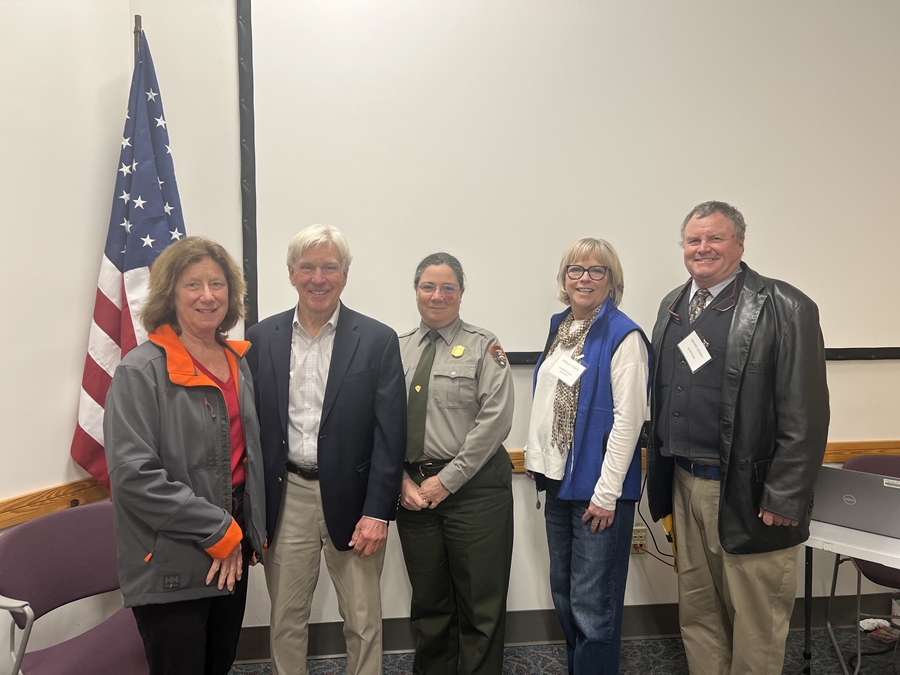EASTHAM — The 309th meeting of the Cape Cod National Seashore Advisory Commission began like many others at the Salt Pond Visitor Center and was even called to order by the same chair as at its last meeting, Richard Delaney.

But the April 8 meeting of the commission, which allows representatives from Provincetown, Truro, Wellfleet, Eastham, Orleans, and Chatham to voice their concerns and opinions directly to National Seashore management, was the first since Sept. 24, 2018.
The commission’s routine reauthorization was halted by the Trump administration, and its mandate expired that year. Efforts to reauthorize it in Congress ran into a series of roadblocks.
“The long hiatus was finally solved by some terrific political leadership,” said Delaney, who thanked U.S. senators Ed Markey and Elizabeth Warren and Rep. Bill Keating for their support of the commission. He also saluted the late former Congressman Bill Delahunt.
After a brief recorded message from Keating, state Sen. Julian Cyr addressed the group.
“This has been a long day coming,” he said. “What makes the Cape Cod National Seashore so remarkable is not just the truly unique natural environment but the people who make a life here and are stewards of this place.”
Those stewards’ chosen delegates — 10 members of the commission and six alternates — then introduced themselves, as did Jennifer Flynn, who became superintendent of the Seashore last November.
“I really do feel like I’ve come home,” said Flynn, who started her career with the National Park Service as a seasonal gate attendant here in 1991.
Delaney said the main priorities for the April 8 meeting were to communicate the purpose of the commission and identify a few high-level issues affecting the six towns it represents.
Commission members raised issues of water quality, mosquito control permitting, fire prevention, housing, zoning, and climate change.
Leslie Jonas, appointed to represent the state government, emphasized the importance of collaboration between the commission and the Mashpee Wampanoag tribe. She suggested that the group consider establishing a cultural respect easement, which would guarantee the tribe’s access for traditional uses.
Kathleen Bacon of Wellfleet encouraged the group to recognize its power. “You are the think tank for towns that intersect with the Cape Cod National Seashore,” she said.
Mary-Jo Avellar, Provincetown’s representative, said she was concerned by the strained relationship between the National Park Service and the residents of the historic dune shacks on Provincetown’s backshore. “The Park Service has a long history of not taking care of these buildings,” Avellar said.
The meeting then took a temporary break to witness that afternoon’s near-total solar eclipse, with participants dispersing to the back patio of the Salt Pond Visitor Center to gaze skyward through special glasses and homemade devices.
After the eclipse break, commissioners listened to public comments, including several about the dune shacks and the leases that are currently being negotiated for them.
Janet Armstrong, whose family has maintained a dune shack for 77 years, said she hoped the commission could bring about a better relationship between the Park Service and the dune shack residents.
“You have the power to help the dune dwellers,” said Gail Cohen, who has advocated for the dune shacks for years and joined the meeting remotely.
The next meeting of the commission will be on July 1, with plans to focus on water management and dune shack leases. Subsequent meetings are tentatively slated to take on land use and fire prevention, zoning policies, and climate change.
Editor’s note: An earlier version of this article, published in print on April 11, incorrectly identified Kathleen Bacon as Wellfleet’s alternate member of the advisory commission. Wayne Clough is Wellfleet’s alternate. Bacon attended the meeting as an interested citizen.



